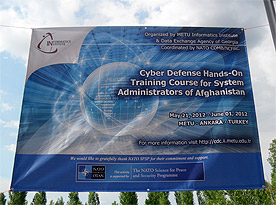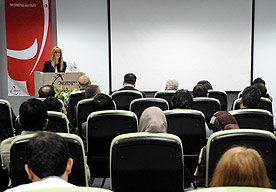Afghan managers train in cyber defence
Managers of the SILK-Afghanistan project will undergo training in cyber defence at the Informatics Institute of the Middle East Technical University (METU) in Ankara, Turkey from 21 May to 1 June. The training, funded by the NATO Science for Peace and Security (SPS) Programme, demonstrates NATO's long-term commitment to Afghanistan during the transition phase and beyond.

"With the transition in Afghanistan, the country needs more cyber defence experts," says Nazife Baykal, Director of the METU Informatics Institute in Ankara and of the Advanced Training Course (ATC). The cyber defence training has been developed in close cooperation between NATO and Georgia. This is the first time that NATO and a partner nation have jointly created such a cyber defence course.
NATO’s Deputy Assistant Secretary General for Emerging Security Challenges, Dr Jamie Shea sees this as another important step in expanding cooperation with partner nations in new fields of activity responding to common security concerns. “Combining lessons learned from partners with NATO’s well-established operational capabilities is the way to go as we approach new challenges to our security in the future, especially in protecting our communication networks through cyberspace,” says Dr Shea.
Georgia's participation is part of its continuing contribution to NATO’s mission in Afghanistan. "Our motives are our continued contribution to the Alliance engagement in Afghanistan beyond 2014 through capacity-building and training of Afghan experts,” says Ambassador Grigol Mgaloblishvili, Head of the Georgian Mission to NATO and co-director of this Advanced Training Course.
This training, which is called "Practical training session in cyber defence for Afghan system and network administrators", has two main objectives: creating an institutional capability and increasing public awareness of cyber threats and the possible protective measures. "This course should provide a tried and tested model for future cooperation between NATO and partner nations, and gradually become a real partnership tool for the Alliance," says Mrs Baykal.
METU: leading IT innovation

Established in 1956 and a member of the European Erasmus Programme, METU is regarded as the best technical university in Turkey and trains more than 20,000 students a year. For the first time, the Institute is going to train Afghan managers in cyber defence in the framework of the SPS Programme.
"Our institute has been selected to provide this high-level practical training in cyber defence for Afghan system/network administrators," Mrs Baykal continues. The Institute has received funding under the SPS Programme. This covers the direct costs of organising the training, travel and subsistence expenses for the Afghan trainees and the expenses of the Georgian lecturers who will share their experiences with the METU staff.
Nazife Baykal was also trained at the prestigious METU and holds a master's degree and a PhD in computer engineering. During her studies, she focused on artificial intelligence, artificial neural networks and forms recognition.
Always ready to take on new challenges, Mrs Baykal went on to specialise in cyber defence. "At a time when warfare is most often conducted in cyberspace, research into this subject is vital, whether at national or international level," she says.
Experimenting with cyber threats and preventive measures

Shafi Tokhi is one of the 16 students who have come to train in cyber security. He teaches computer science at Herat University in Afghanistan. He is also the head of the Network Operations Centre and thus responsible for managing the Internet bandwidth for all 13 faculties of Herat University.
The 10-day training course includes cyber security awareness, pre-emptive security strategies, and threat identification and response.
"This training will enable me to resolve certain problems that we face in protecting the computer network of Herat University, particularly regarding data integrity, confidentiality and security," says Mr Tokhi.
Unfortunately, Afghanistan has become a testing ground for cyber attackers, where many malicious viruses are spreading, particularly via USB sticks. "More and more vital information is being exchanged, stored and transferred via the Internet, so network security has become a major issue which must be seriously taken into account by all network administrators in order to prevent cyber attacks as much as possible," Mr Tokhi explains.
"As institutions evolve in Afghanistan, it is important to ensure the proper functioning of the digital infrastructure of the country. In Lisbon and Bonn, the international community pledged to help Afghanistan develop its socio-economic infrastructure. Cyber space is part of such an infrastructure and through this training course, we contribute to this goal,” says Ambassador Mgaloblishvili.
In addition to the lectures, there will be laboratory sessions during which students will be able to experiment with the threats and defensive measures studied during the course. They will also learn some principles of cryptography, as well as basic security services and protocols. This course will pave the way for a more advanced programme on information system security which may be offered in the near future.
When they return to their own institutions in Afghanistan at the end of their training, the students will have acquired skills enabling them to protect their networks and systems against several types of cyber attack.
High-speed internet access for Afghan universities
The SILK-Afghanistan project provides affordable, high-speed Internet access via satellite and fibre optics to Afghan universities. The project has been in operation at Kabul University, Afghanistan, as part of its predecessor project, the “Virtual Silk Highway”, since 2006. It now connects 18 of the country's 26 universities. The aim is to increase this number to 22 during the coming months.
